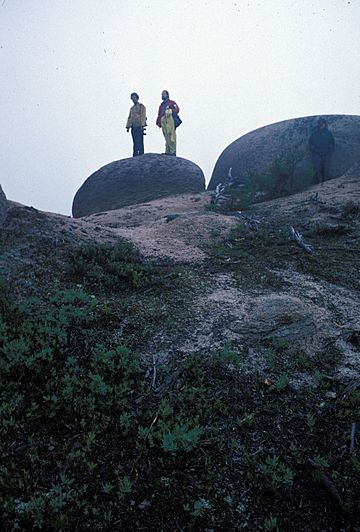Colonels Mountain (New Brunswick) facts for kids
Quick facts for kids Colonels Mountain |
|
|---|---|

Tors on Colonels Mountain
|
|
| Highest point | |
| Elevation | 600 m (2,000 ft) |
| Geography | |
| Location | Northumberland County, New Brunswick |
| Parent range | Appalachian Mountains |
| Topo map | NTS 21O/01 |
| Climbing | |
| Easiest route | Hike |
Colonels Mountain is a cool mountain located in the Canadian province of New Brunswick. It sits right next to Big Bald Mountain. This area is special because it's where two important rivers, the Northwest Miramichi River and the Sevogle River, begin their journey.
Contents
What Makes Colonels Mountain Special?
Colonels Mountain is known for its unique rock formations found at the very top. These formations are called tors. Imagine giant, mushroom-shaped rocks made of granite! They look really interesting and are a big reason why this mountain stands out.
How Tors Are Formed
Tors are created by a process called weathering. This is when rocks are slowly broken down by natural forces like wind, rain, and ice over a very long time. For tors, the process usually involves water seeping into cracks in the rock. When the water freezes, it expands, making the cracks bigger. Over millions of years, this process shapes the rocks into their unique forms.
The Mystery of Colonels Mountain's Tors
Scientists have studied the tors on Colonels Mountain. The way these tors look suggests something special about the mountain's past. Normally, it takes a very, very long time for tors to form. This has led some scientists to believe that parts of northern New Brunswick, including Colonels Mountain, might have escaped the last major ice age. This ice age is known as the Wisconsinan glaciation.
Escaping the Ice Age
During an ice age, huge sheets of ice, called glaciers, move across the land. These glaciers are incredibly powerful and can scrape away mountains and reshape the landscape. If Colonels Mountain truly escaped the last ice age, it means its delicate tors weren't destroyed by the moving ice.
However, another idea is that the mountain was near the center of the giant ice cap. In this case, the ice might have been frozen to the ground, moving very slowly. This would have protected the tors from being scraped away by the fast-moving parts of the glaciers. Either way, these amazing rock formations tell us a lot about the Earth's ancient history and how landscapes change over time!
 | Delilah Pierce |
 | Gordon Parks |
 | Augusta Savage |
 | Charles Ethan Porter |

